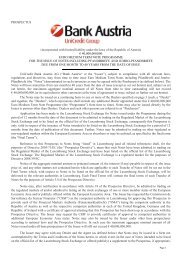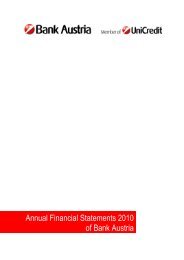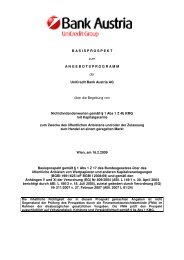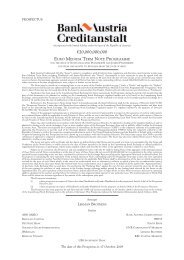Annual Financial Statements 2011 of Bank Austria
Annual Financial Statements 2011 of Bank Austria
Annual Financial Statements 2011 of Bank Austria
You also want an ePaper? Increase the reach of your titles
YUMPU automatically turns print PDFs into web optimized ePapers that Google loves.
Management Report<br />
Management Report (CONTINUED)<br />
Outlook for <strong>Bank</strong> <strong>Austria</strong>’s performance<br />
The outlook for banking business in <strong>Bank</strong> <strong>Austria</strong>’s perimeter <strong>of</strong><br />
operations is determined by expectations <strong>of</strong> low growth in Western<br />
Europe, at a rate which will be just above zero, and <strong>of</strong> more moderate<br />
growth in Central and Eastern Europe, and by the probability <strong>of</strong><br />
a deflationary rather than inflationary monetary environment. The<br />
foreseeable stricter regulatory requirements are likely to reduce the<br />
credit multiplier. Given the confidence crisis, and despite ample<br />
supplies <strong>of</strong> liquidity by the ECB, the interbank market is still not<br />
operating effectively; this has an impact on liquidity management<br />
and also indirectly affects a number <strong>of</strong> capital market-related<br />
financing instruments. The operating environment for the banking<br />
industry means that volume trends and margins in the coming year<br />
will not enable <strong>Bank</strong> <strong>Austria</strong> to generate a level <strong>of</strong> annual revenue<br />
growth which was quite normal in the years before 2009; growth<br />
will be moderate, in line with the overall market. However, after the<br />
substantial one-<strong>of</strong>f charges absorbed in <strong>2011</strong>, we expect that the<br />
bank’s strong operating performance will again feed through to<br />
bottom-line pr<strong>of</strong>its to a larger extent.<br />
� The objective <strong>of</strong> our multi-year plan is to make the bank’s performance<br />
sustainable in this scenario <strong>of</strong> what is widely referred to<br />
as “the new normal”. These are the basic pillars <strong>of</strong> the plan: targeted<br />
employment <strong>of</strong> capital, pursuing a focused growth strategy in<br />
CEE, simplifying our organisational set-up and processes, and maintaining<br />
strict cost management. <strong>Bank</strong> <strong>Austria</strong>’s strong equity capital<br />
base enables the bank to pursue further growth and will exclusively<br />
support commercial banking business with customers. We will give<br />
close attention in <strong>Austria</strong> to risk-adjusted capital efficiency down to<br />
the level <strong>of</strong> individual transactions. Capital allocation provides CEE,<br />
one <strong>of</strong> the few growth regions, with a sound base for further expansion.<br />
In pursuing expansion, we will focus on countries which are<br />
ahead in terms <strong>of</strong> revenue/risk considerations as well as market<br />
size and growth, and where we hold strong market positions: these<br />
countries are Turkey, Russia and the Czech Republic. In the other<br />
countries we will pragmatically focus our business portfolio on a<br />
case-by-case basis. We seek to achieve a sound balance <strong>of</strong> local<br />
credit expansion and local deposit growth in all countries.<br />
All this does not change our determination to operate as a European<br />
bank throughout Central and Eastern Europe. Despite regional divergence<br />
and structural differences, the growth potential <strong>of</strong> the banking<br />
sector in CEE countries remains intact. This is based on the<br />
economic catching-up process and the accelerated monetary cycle,<br />
and also on convergence in terms <strong>of</strong> wages, standard <strong>of</strong> living and<br />
consumer habits. The latter factors hold out the prospect <strong>of</strong> gradually<br />
closing the gap in the supply <strong>of</strong> modern banking products and<br />
services. Various cost reduction programmes are under way to<br />
enhance cost efficiency by redimensioning head <strong>of</strong>fices after the<br />
numerous integration tasks performed in the past years; this process<br />
involves the pooling <strong>of</strong> real estate used by the banks them-<br />
selves in several countries. The establishment <strong>of</strong> cross-regional<br />
infrastructure for transaction settlement, IT and internal services is<br />
also <strong>of</strong> great significance in the long term. A major step forward in<br />
this context was the creation <strong>of</strong> UBIS, with UBIS <strong>Austria</strong> as one <strong>of</strong> its<br />
components, in <strong>2011</strong> and 2012, which will enable us to unlock synergies<br />
in the coming years. This is particularly important as demands<br />
on IT and back-<strong>of</strong>fice operations are rising (taxation <strong>of</strong> capital gains<br />
on the sale <strong>of</strong> securities, reporting and regulatory requirements etc.).<br />
� We expect that the moderate revenue growth planned for 2012<br />
will be reflected in operating pr<strong>of</strong>it to a larger extent. We believe that<br />
the reduction <strong>of</strong> net write-downs <strong>of</strong> loans and provisions for guarantees<br />
and commitments in the past few years will be sustainable,<br />
even though fluctuations over time cannot be excluded. While the<br />
provisioning charge in <strong>Austria</strong> has declined to a very low level, there<br />
is further potential for restructuring in CEE, especially in those countries<br />
which originally caused the strong increase in the provisioning<br />
charge. This points to a continued upward trend in net operating<br />
pr<strong>of</strong>it. On this favourable basis we assume that the substantial<br />
goodwill impairment charges which <strong>Bank</strong> <strong>Austria</strong> had to absorb in<br />
<strong>2011</strong> will not be repeated in 2012 and 2013. As far as sovereign<br />
risks are concerned, we expect that there will be no further debt<br />
restructuring outside Greece. After the lessons learned in the past<br />
year, the determination <strong>of</strong> the Eurogroup, the EU and the European<br />
institutions to avoid contagion enjoys credibility, as does the path<br />
towards stricter fiscal discipline in Europe. We have adjusted the valuations<br />
<strong>of</strong> our subsidiaries and equity interests in other companies<br />
in CEE to the new business outlook on several occasions since<br />
2008, most recently in <strong>2011</strong>. These adjustments have been substantial,<br />
so that similar charges should not recur. Apart from any<br />
unexpected risks which may arise from geopolitical developments,<br />
for example, we think that a larger proportion <strong>of</strong> the anticipated stable<br />
or slightly stronger operating performance is likely to feed<br />
through to <strong>Bank</strong> <strong>Austria</strong>’s net pr<strong>of</strong>it.<br />
� <strong>Bank</strong> <strong>Austria</strong> coped well, without state aid, in the crisis years. Its<br />
strong operating performance enabled the bank to absorb substantial<br />
burdens arising from adjustments. Over the past few years we<br />
have aligned our business model with sustainability criteria. The<br />
main features are the top priority given to customer business and<br />
the renewed attention to our core economic functions – and this<br />
includes a permanent commitment to CEE. We are also determined<br />
to play an active role and share responsibility as a corporate citizen<br />
in all countries and local communities in which we operate. We want<br />
to contribute to restoring the reputation <strong>of</strong> banking operations within<br />
a short time.<br />
Developments in the banking sector and at <strong>Bank</strong> <strong>Austria</strong> will not only<br />
reflect economic trends and our response to them. A decisive factor<br />
will be the regulatory framework in which we operate. We have prepared<br />
for the regulatory changes arising from Basel 3, including<br />
capital ratios, SIFI requirements, changes in the definition <strong>of</strong> equity<br />
<strong>Bank</strong> <strong>Austria</strong> · <strong>Annual</strong> <strong>Financial</strong> <strong>Statements</strong> <strong>2011</strong><br />
56
















